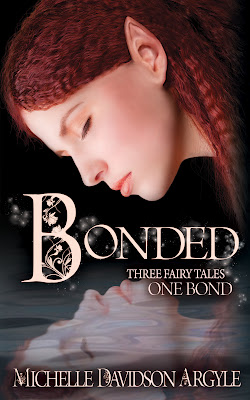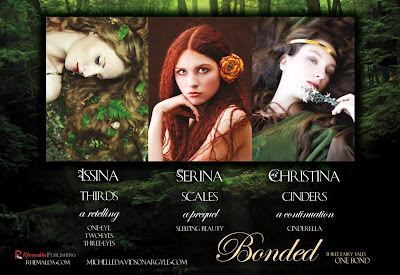
Michelle’s latest book, BONDED , came out last week. It’s a collection of three fairytale novellas–a prequel to Sleeping Beauty, a retelling of One Eye, Two Eyes, Three Eyes, and a sequel to Cinderella.
, came out last week. It’s a collection of three fairytale novellas–a prequel to Sleeping Beauty, a retelling of One Eye, Two Eyes, Three Eyes, and a sequel to Cinderella.

Today I’m happy to post an interview with Michelle, who happens to be not only an excellent writer, but a fantastic person. Today we’re swapping interviews, so you can find her spotlight of Chasing the Skip over at her blog.
I’ve asked her to talk a little about fairy tale theory, which was an academic obsession of mine as an undergrad. As a result, the question I asked sounds a little like a short answer from an English test–but Michelle was kind enough to give it a thoughtful answer.
When speaking of fairy tales, theorist Sheldon Cashdan said, “The way fairy tales resolve inner struggles [between positive and negative forces in the self] is by offering children a stage upon which they can play out their inner conflicts. Children, in listening to a fairy tale, unconsciously project parts of themselves into various characters in the story, using them as psychological repositories for competing elements of the self.” As an example, Cashdan offers that the queen in Snow White embodies narcissism, and as she is defeated, the children are able to defeat their own narcissism in effigy.
In Bonded, you tell three stories based on fairytales–one prequel, one sequel, and one retelling. While the stories you’re working with are usually thought of as children’s stories, your book is aimed at a mature audience. Do you agree that fairy tales can be emotional stages for playing out the inner conflicts? To what extent do you think that fairy tales can do this for adults as well? Does all literature behave this way, or is there something unique about fairy tales? Does this have anything to do with the appeal of fairy tales to you as a writer, or did you write about them for other reasons?
Thanks for your question, Janci! I’ve heard fairy tales can act as a stage upon which the reader plays out inner conflicts. At first, I wanted to answer that no, this was not the reason I set out to write my fairy tale based stories, but then I started thinking about it closer and realized that perhaps you’ve hit something on the head. Allow me to explain.
When I began Cinders, my novella about Cinderella after she marries her prince, my main intent was to explore the side of a fairy tale I had never seen before — a more realistic side. I’ve seen fairy tales set in contemporary settings, and I’ve also seen them go extremely dark in an attempt to give a more realistic edge to the story, but I don’t often see fairy tales twisted in such a realistic way that I’ve honestly been able to imagine myself in the same setting in my own real world (no matter the time period). That’s what I wanted to do. I wanted real consequences, real emotions, and real scenarios, even if some magic was thrown in. I wanted it all to feel real and relatable. For me, a girl who has lived under the tyranny of her stepmother and stepsisters and suddenly enters a wondrous world in a palace with a prince would probably have some gritty issues to work through with such a fantastic change. Marriage itself is a huge change, not to mention everything else Cinderella must adjust to. That’s where I see a perfectly set stage in which to tell a story. In that sense, I can easily see the novellas in Bonded acting as emotional stages for readers to play out their inner conflicts. What young girl entering marriage doesn’t have some bumpy spots? And what common girl suddenly thrust into a royal position wouldn’t have some learning to do? Cinders may be set in a somewhat fantastical setting with some fantastical creatures, but scenarios should hit close to home for many readers. In this sense, yes, I was thinking of an emotional stage, absolutely.
The other two novellas in Bonded maintain similar emotional stages, where my intent was to build very real scenarios set in fantastical but relatable settings. As for how adults relate to fairy tales, I believe Bonded is for more mature readers because of the types of scenarios I set up. Marriage in Cinders, forgiving people who abuse you in Thirds, and sacrificing yourself for someone you love in Scales. Those are some pretty heavy things to set yourself up against, so you can see why a younger audience might have a hard time with the stories. Considering all of that, yes, I do think fairy tales and fairy tale based stories can act as emotional stages for more mature audiences. In fact, I think Bonded is the perfect arena for such a thing, since it feels real while also maintaining elements of magic. An adult reader can remove themselves enough to dive into the story, but also feel close enough to the characters and what they might represent to play out their own inner conflicts.
I think literature, overall, offers readers not only a source of entertainment, but good literature will also offer readers the stage you refer to — a place where we can understand ourselves on levels we might not otherwise see. Fairy tales aimed at children seems to offer a more simplified stage, but I’ve found it fun to create more complexities and give adults a similar stage on which to play.
Thanks for your answer, Michelle. You can find out more about Michelle and Bonded at Michelle’s website or blog.
, came out last week. It’s a collection of three fairytale novellas–a prequel to Sleeping Beauty, a retelling of One Eye, Two Eyes, Three Eyes, and a sequel to Cinderella.


